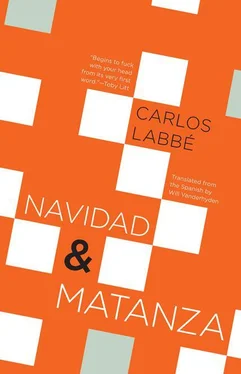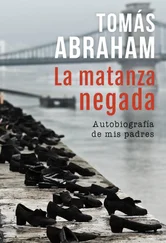After he ate and finished off another glass of boxed wine that the man from the service station had offered him, Patrice Dounn proceeded to clear the kitchen table. Diligently he washed the dirty plates, glasses, and silverware, and cleared away the other things: the cruet, a journal of universal history that his host was reading, his own cell phone. He even removed the plastic tablecloth, which he folded neatly and placed in a corner of the kitchen. On the clean table he set down the black instrument case. He’d begun to open the clasps when suddenly he stopped and looked at the man from the service station, who was watching him from the door, a cigarette between his fingers. For the first time he understood how spiders and insects feel when someone observes them before stepping on them. That’s how don Patrice looked at me, he said. He maintained eye contact for a few seconds until he could no longer stand it. He went into the hallway, asking the foreigner if something was wrong. Nothing, said Dounn, I just want to know if I can trust you. Yes, of course, whatever you need, was the host’s reply. Then the Congolese added: This goes with you to the grave, understand? And he opened the case.
Inside there was no instrument. Just small cans made of a thin material, without label, arranged vertically. Dozens of cans. The host — maybe instinctively, he didn’t know — hurriedly dug through a drawer of knives to find a can opener for the visitor. Then he left the kitchen, heading to the bathroom. He wasn’t feeling well.
When he came back, both Patrice Dounn and his case had disappeared. He didn’t see any sign in the garbage of the can that’d been opened, judging by the can opener — washed and dried meticulously, although still damp — sparkling on the table. The door to the guest’s bedroom was closed. Again the man from the service station felt “fear in my gut and in my eyes and my hair. I’m telling you, my hair was standing on end. But then the urge to vomit passed, and I wanted to run, to head to the beach, to chase after women, or dance to a slow song.”
But he never managed to do anything, because suddenly he heard someone pounding forcefully on the front door. It was the foreigner’s friends. They were upset because they’d spent more than ten minutes calling and no one had come out to greet them. “One lady, one gentlemen, and two teenagers, they seemed to have been arguing among themselves. They were constantly interrupting each other, even the little girl would aggressively grab her father’s shoulder every time she wanted to say something.” They explained to him that they’d already spent two days in Navidad and that they wouldn’t be spending the night at his house, although of course he’d be compensated. They were counting, however, on his discretion, the gentlemen told him in a low voice, while taking his hand for a second. When he withdrew his hand, in his palm, the man from the service station found a twenty-dollar bill. They asked about Dounn. The man said he didn’t know, that he’d disappeared unexpectedly. Then they got back into a luxury Japanese sedan and left. Only Elena, Juan Francisco, and Bruno. When he went back into the house the man from the service station found Alicia sitting on his living room floor, looking through the book he was reading at the time. Always science fiction, really cheap editions that he bought in Pichilemu, he told me. How boring, said Alicia, and she asked what his name was. Then she wanted to know about his job and if he had any children. The girl took a cigarette from the pack that he had in the kitchen and put it in her mouth. The man offered her a light. Alicia made a noise, her tongue against her teeth. She said she didn’t smoke, that he should leave her alone. Please, tell me where the beach is, I can’t find it.
The man from the service station accompanied Alicia to the beach, walking two steps behind her for several kilometers through the night. She asked many questions and he answered them, aware all the time of the cash he’d make housing this strange group of people for a few days. Afterward everything would be calm and normal again. That’s what he believed, he said. But it wasn’t so. Every once in a while the girl would yell: Right? Left? And now, which way? It was like she was walking with her eyes closed, like she wanted to be guided in the darkness. Then all of a sudden the sound of the sea was very near. When the sand and docas came into view, Alicia started to run. Rising up from down below he heard a shrill, sharp sound. At first it seemed to him that a woman was screaming. Then he thought someone was doing something bad to the young girl. He quickened his pace across the beach. The night was moonless, and there were no streetlamps in the town, and so he was barely able to make out two distant silhouettes approaching the water. Little by little the shrill sound turned into a birdsong, into the gurgle of an immense stomach, and finally into a strange music. “A female robot, singing with her mouth shut in the shower,” that’s how Patrice Dounn’s theremin sounded to the man from the service station. The foreigner was standing on a dune, an open case beside him — a different case, not the one he’d opened in the kitchen — his left hand suspended above a strange gleaming, blue instrument. The other hand, the right hand, moved slowly toward and away from the object. The music was very beautiful.
The man from the service station sat down to listen a few feet away. Soon, a third sound rose through the noise of the ocean and the song of the theremin. It was the voice of Alicia Vivar, who’d sat down silently next to the man from the service station. Resting her head on his arm she stared up at the stars. She hummed the melody that Dounn’s instrument was playing, while at the same time, with a finger, she drew concentric circles in the damp sand, each one larger than the last.
Finally they were quiet, Alicia and the theremin. For a moment there was silence, “because the sound of the sea doesn’t exist for those who live near it,” said the man. Then the girl told him to look out at the waves. Patrice Dounn had begun to play another song. This is my favorite, “La Mer,” by Debussy, Alicia whispered. Then she stood up and ran to embrace the Congolese.
DURING ONE OF MANY calm Sunday afternoon conversations in Sabado’s white bedroom, I looked up from the computer screen, where I was reviewing her chapter of the novel-game, and spoke. What I’m going to tell you is a secret: when I was young I loved that song from The Sound of Music , called “My Favorite Things”: Raindrops on roses and whiskers on kittens, bright copper kettles, lalala-lala . She smiled. I continued. I’ve always liked inventories, Je me souviens by Perec, or that other essay by Barthes where he lists his tastes. She said to me: That’s true, inventories are beautiful when making them isn’t obligatory. Above all I like lists as a literary form. She looked me in the eyes and added: Now, imagine a man, a theft, the murmur of the sea, the sound of people playing paddleball, the cry of seagulls, the playful flirtation of a man and a woman who are dodging the waves, a man and woman who at the same time sit down in the shade of a dune to look at some photographs. Does it say somewhere that our lives should be uncomfortable? Yes. The world. The rock. The sand. The sun.
Imagine then that the first man stole some towels. That he began running toward the dunes. That he heard the shouts of people behind him, the lifeguard’s whistle. Get the thief, Get the thief. Someone tried to stop him by throwing a paddleball racquet at his legs. The impact of the wood against his shins hurt, but he kept running. Speed. There were many things he wanted to think about as he ran, clutching the new towels in his arms, but all he felt was the sand burning the soles of his feet. Through his mind flashed an evening in a campsite when Boris had taught them that to avoid being burned you had to focus your attention on the foot that cooled for an instant as it lifted up into the air away from the heat. He looked toward the end of the beach, past the dunes, where she’d be waiting for him, tan, half-naked, behind her dark sunglasses, the keys to the Spyder hanging from the tip of her erect ring finger. He yelled to her: Come on Alicia, run. The girl ignored him; she kept looking at the photographs and talking with her friend. And why should she respond? Her name wasn’t Alicia. By the third shout, he was right in front of her, and she realized something odd was going on. She handed the photos to her friend, who sat beside her staring at the sea. She stood up and looked directly into the eyes of the man, who was gasping, covered in sweat. Before he could say anything, three policemen were dragging him toward a squad car. The towels were left behind, abandoned, there, at her feet. Sabado had to stop because it was getting late and I had to leave.
Читать дальше












